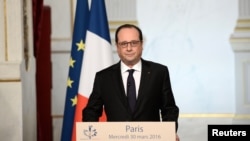Blaming his political opponents, French President Francois Hollande abandoned plans Wednesday to push through deeply controversial constitutional changes that included stripping French citizenship from convicted terrorists and enshrining the state of emergency into the nation’s charter.
“Part of the opposition has been hostile to all constitutional revisions,” Hollande said as he made his announcement, adding, “I deplore this attitude.”
The move underscores the deep rifts over how to deal with terrorism four months after the attacks in Paris, and just a week after the Brussels bombings. The two appear to be closely linked.
Both France and Belgium are grappling with how to respond to the terrorist threat, but Hollande’s push for constitutional changes and France’s current state of emergency — now in its fifth month — have been particularly divisive.
While the constitutional amendments passed the socialist-controlled National Assembly, or lower house, earlier this year, the conservative-controlled Senate offered up a different version of the legislation, making its passage difficult, if not impossible.
Casting blame
A year before general elections, politicians on both sides of the aisle lost no time pointing fingers.
“We are at the heart of Mr. Hollande’s system,” said former president Nicolas Sarkozy who heads the center-right Republicans party. “While promising everything and its contrary, piling lies upon lies, the reality is he is condemning the country to blockage and immobility.”
But Socialist Party head Jean-Christophe Combadelis laid the blame squarely on the conservatives for failing to put aside partisan differences and “enter into a national union” to fight terrorism.
Either way, analysts assess the fallout as a fresh setback for deeply unpopular Hollande, who is struggling to revive the economy and grow jobs before he faces reelection.
“For Francois Hollande, this renouncement is a heavy political defeat, especially since he did everything to try to reunite Congress,” wrote the French newspaper La Croix.
Hollande is additionally weakened within his own leftist ranks, where the legislation has likewise been divisive. His justice minister, Christiane Taubira, resigned in January over the nationality-stripping clause.
Unfair to Muslims
Rights groups also sounded the alarm over the measures.
“We are relieved the government finally realized the need for political and citizen debate over these fundamental rights such as stripping citizenship and the state of emergency,” said free speech advocacy officer Dominique Curis of Amnesty International France, reacting to the repeal of the measures.
“Stripping citizenship is probably not the answer to terrorism,” she added. “There are more risks than benefits.”
Even without being enshrined in the constitution, France’s current state of emergency — announced following November’s attacks that killed 130 people — is still extremely controversial. Thousands of soldiers have been deployed across the country to guard sensitive sites, and police have been granted sweeping powers to search premises and place suspects under house arrest without court warrants.
While many ordinary French supported the extrajudicial measures after November's attacks, rights groups and activists denounce them as unfair and biased against France’s five-million strong Muslim community.
“It’s arbitrarily targeted a whole population, who have been prevented to work, whose apartments and lives have been overturned because of suspicions based on almost nothing,” said Alexandre Piettre, a sociologist at the Societies, Religions and Secularity Group, a Paris-based think-tank.
Strikingly, the Belgian government has not instituted a state of emergency following last week’s terror attacks, even though the attacks were eerily similar to those in Paris, with shared suspects.
Former French anti-terrorist judge Marc Trevidic strongly urged Belgium not to follow France’s example, saying the emergency measures had led to mistakes and were only marginally effective.
“It makes no sense,” he told Belgium’s Le Soir newspaper. “It’s stupid. But nobody wants to say so.”







